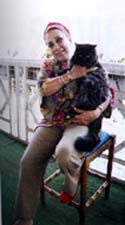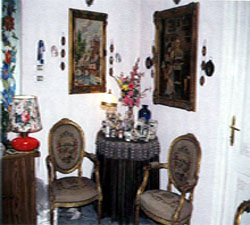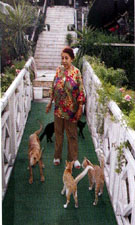|
For all its undeniable allure, romance and excitement,
the Egyptian capital is polluted and noisy. Everywhere
you go the lively strains of the latest smash hits meld
with a thousand car horns producing an almost
inescapable cacophony.
But the only sounds reaching the ears of Cairo's boat
people - residents of the city's houseboats or 'awamat'
- are the songs of migrating birds, the 'shush' of palm
trees undulating in the wind, the muezzins' call to
prayer and the gentle lapping of the Nile against the
sides of their floating homes.
"Once you live on the Nile, you will never return to the
shore," says Ikhlas Helmy, who was born and bred in one
of the oldest houseboats and now owns one of the
smartest. "It's a world apart. Here we breathe fresh
air, profit from our country's glorious weather... and,
best of all, we never feel alone."
In 1950, there were 300 houseboats or 'awamat', while
today there exists just a tenth of that number, and they
are under threat from the Giza Municipality, which every
so often attempts to turn the shoreline into a public
walkway... and the houseboats into firewood.
Such bureaucratic meddling has had the effect of turning
houseboat owners and residents into a battling
community. They won the last round in the courts several
years ago but are constantly braced for the next
onslaught. In the meantime the riverside community -
consisting of Egyptians, Saudis, Britons, French,
Germans, Australians and Italians - has a real open door
policy with everyone in and out of each other's homes.
Their case wasn't helped when two fatalities arose due
to the sinking of a dilapidated boat, while a further
couple were almost reduced to floating scrap when one
was torn from its moorings following the collision of
two large barges heading north. It, in turn, collided
with its neighbour.

They would have been sunk, too, if it hadn't been for
the efforts of a fisherman who lives on a rowing boat.
He not only led the charge to keep the damaged
houseboats stable, but also furiously rowed after one of
the errant barges and fought with its crew to prevent it
from leaving the scene before the coastguard's arrival.
Such negative aspects of riverside living were far from
my mind during my impromptu visit to the amazing world
of Madam Ikhlas. A gentle push on a rounded wooden door
set in a wall on a busy thoroughfare brought me into
Cairo's answer to The Secret Garden.
Behind me was a concrete jungle. Before me were steps
cutting down through flowers, plants, lemon and guava
trees as well as date palms. The scent of jasmine and
hibiscus filled the air while dozens of cats preened
themselves or were curled up all over the place,
seemingly without a care in the world.
A couple of friendly dogs checked me out by sniffing my
hands and demanded to be patted before I was led through
a lovingly decorated sitting room its chairs occupied by
some of the boat's 10 feline occupants, including an
enormous Persian, an attention-demanding Siamese and an
eyeless kitten, which had wandered in one day after a
fight.
As though the presence of an uninvited guest - and a
British one at that - was the most normal thing in the
world, Ikhlas guided me onto the cushioned veranda
before offering squash made with lemons gathered from
her own trees.
There it was. The Nile in all its splendour stretching
left and right as far as the eye could see. As we
chatted a group of European tourists floated past waving
madly, a wedding party celebrated on a small craft in
the distance, while a luxurious Lebanese restaurant ship
glided by. It was then that the awama began to gently
rock from side to side.



A cosy corner inside Ikhlas Helmy's
awama with a table packed with photographic memories.
Ikhlas laughed and said: "The Nile is like an imperious
king. When he is angry, the waves are high but when he
is content, the water resembles a pool of oil."
Despite her obvious love of the water, upon her marriage
to a wealthy socialite, Ikhlas reluctantly moved to an
apartment on the posh island of Zamalek. "It was like a
prison," she said, explaining: "My husband loved the
Nile too but he wasn't prepared to live on it. After his
death, I moved back."
Ikhlas, now in her late 50s, was stunning as a young
woman as I ascertained from old photographs. She told me
how there had once been a club for the sons of the
aristocracy opposite the awama where she lived as a
girl.
"Those naughty boys would hire rowing boats, jump in the
water and pretend they had fallen in," she said. "At
first, my father would help them on board and give them
tea until he realised that all they wanted to do was get
a better look at me."
One of the boys must have liked what he saw as several
years later, now a captain, he called on her parents to
ask for her hand. He was too late. Ikhlas was already
spoken for.
But the history of the awamat or 'dahabiehs', as they
are sometimes called, goes back even further than Ikhlas
can remember. Most of them are moored in an area called
Kit Kat, once the name of a nightclub frequented by King
Farouk.
Early in the 20th century, they represented summer
'houses' for Turkish gentry or 'Pashawat' as well as
bohemian retreats for such well-known celebrities as
singer Farid Al-Atrach and actor Naguib Al-Rehani, not
to mention an assortment of Oriental danseuse.
During World War II, British army officers sequestered
Nile houseboats, while one became a bolthole for two
German spies, hidden there by Count Laszlo Almasy whose
life-story featured in the award-winning movie The
English Patient.
The Days of Sadat, an Egyptian film, portrays Anwar
Sadat conspiring with the spies against the British on
their houseboat hideaway some 20 years before he became
the country's leader.
Nobel Laureate Naguib Mahfouz uses an awama as a
backdrop for his depiction of political rebel rousers
passing around their shishas (water-pipes) while
criticizing the government.
Rumour has it that King Farouk's mother Queen Nazli had
her own houseboat 'Misr', moored off Zamalek where she
would entertain away from prying eyes.
At the turn of last century, it was mandatory for
houseboat owners to paint their vessels with gold paint,
hence the alternative name 'Dahabieh' meaning 'golden'.
The golden days of the Nile houseboats may be long gone
and their future is far from assured. If you would like
your own experience of history before it's too late,
then why not rent an awama during your next visit to
Cairo.
Each one is different from the other. Some resemble
bourgeois homes; others are grandly decorated with
marble columns, while a few look as though they were
plucked from New Orleans. A Saudi-owned houseboat has
been modelled on Japanese lines, its wooden walls
replaced by floor to ceiling windows.
Prices vary too according to the condition of the awama
and its individual facilities. There are those, which
boast air-conditioning and satellite television, and
there are others relying on cooling breezes for
refreshment and the spectacular sunsets for
entertainment. You should be able to rent a nicely
furnished houseboat with all mod cons for around
US$1,000 per month. If just one floor will do, then
US$500 should suffice.
Whereas this old Piscean envisaged only romance and
adventure, my practical-minded husband anticipated
storms and mosquitoes. And so, like Ikhlas once was, I
am destined to remain behind four walls with the Nile
and its magic forever just out of my reach.
| 